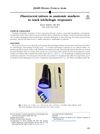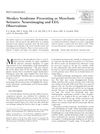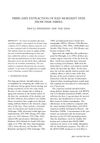 July 2018 in “Journal of The American Academy of Dermatology”
July 2018 in “Journal of The American Academy of Dermatology” Fluorescent tattoos are a good way to mark the scalp for hair treatments because they're accurate, invisible in normal light, and have low risk.
 393 citations,
November 2000 in “Archives of General Psychiatry”
393 citations,
November 2000 in “Archives of General Psychiatry” Testosterone is important for men's sexual function, may help some women's sexual desire, while other hormones and neurotransmitters also play complex roles in sexual behavior.
 188 citations,
October 2012 in “The AAPS Journal”
188 citations,
October 2012 in “The AAPS Journal” The document concludes that developing generic topical drugs requires ensuring they match the original in quality, composition, and structure, and often involves complex testing and regulatory steps.
 94 citations,
May 2011 in “BJCP. British journal of clinical pharmacology/British journal of clinical pharmacology”
94 citations,
May 2011 in “BJCP. British journal of clinical pharmacology/British journal of clinical pharmacology” Hair follicles greatly increase caffeine absorption through the skin shortly after it's applied.
 82 citations,
May 2009 in “BJCP. British journal of clinical pharmacology/British journal of clinical pharmacology”
82 citations,
May 2009 in “BJCP. British journal of clinical pharmacology/British journal of clinical pharmacology” Caffeine penetrates human skin in lab tests similarly to real-life conditions, but actual skin use is still essential for accurate results.
 76 citations,
February 2015 in “Industrial Crops and Products”
76 citations,
February 2015 in “Industrial Crops and Products” Researchers found over 40 compounds in Bituminaria bituminosa, including many flavonoids and some with potential for medical and hair care uses.
 61 citations,
September 2010 in “Fitoterapia”
61 citations,
September 2010 in “Fitoterapia” Extracts from Tridax procumbens L. have strong anti-inflammatory and antioxidant effects and block inflammation-causing enzymes.
 49 citations,
September 2008 in “International journal of pharmaceutics”
49 citations,
September 2008 in “International journal of pharmaceutics” Artificial sebum L closely mimics human sebum for drug delivery research.
 39 citations,
December 2013 in “Phytotherapy Research”
39 citations,
December 2013 in “Phytotherapy Research” Safflower (Carthamus tinctorius) extract helps hair grow and could be used in hair products.
 33 citations,
June 2007 in “International Journal of Pharmaceutics”
33 citations,
June 2007 in “International Journal of Pharmaceutics” The conclusion is that measuring how drugs partition into artificial sebum is important for predicting their delivery into hair and sebaceous follicles, and it provides better information than traditional methods.
 31 citations,
January 2017 in “Phytotherapy Research”
31 citations,
January 2017 in “Phytotherapy Research” Ziziphus jujuba Mills may have health benefits, but more research is needed to confirm its safety and effectiveness.
 31 citations,
December 2002 in “Biochimica et biophysica acta. G, General subjects/Biochimica et biophysica acta. General subjects (Online)”
31 citations,
December 2002 in “Biochimica et biophysica acta. G, General subjects/Biochimica et biophysica acta. General subjects (Online)” The research found two types of calcium in human hair, one that varies among individuals and another that is consistent across people.
 30 citations,
June 2016 in “European Journal of Pharmaceutical Sciences”
30 citations,
June 2016 in “European Journal of Pharmaceutical Sciences” Optimized film improves finasteride skin absorption and treatment efficiency.
 29 citations,
September 1990 in “Biochemical Journal”
29 citations,
September 1990 in “Biochemical Journal” Enzyme purified and characterized for minoxidil sulphation in rat liver.
 28 citations,
April 2008 in “Journal of Inclusion Phenomena and Macrocyclic Chemistry”
28 citations,
April 2008 in “Journal of Inclusion Phenomena and Macrocyclic Chemistry” Minoxidil mixed with β-cyclodextrin improves solubility and gradual release.
 26 citations,
March 2015 in “Phytotherapy Research”
26 citations,
March 2015 in “Phytotherapy Research” Forsythiaside-A, a natural substance, can protect against hair loss and is more effective than current treatments, potentially making it a good option for hair loss treatment.
 24 citations,
January 2015 in “Evidence-based Complementary and Alternative Medicine”
24 citations,
January 2015 in “Evidence-based Complementary and Alternative Medicine” Polygonum multiflorum can promote hair growth when taken orally or applied topically.
 23 citations,
March 2019 in “Journal of Essential Oil Research”
23 citations,
March 2019 in “Journal of Essential Oil Research” Rosemary's antioxidant content changes with the climate and season.
 22 citations,
August 2011 in “Journal of Supercritical Fluids”
22 citations,
August 2011 in “Journal of Supercritical Fluids” Rice bran extract might help prevent hair loss.
 21 citations,
January 1995 in “Journal of the American Institute for Conservation”
21 citations,
January 1995 in “Journal of the American Institute for Conservation” A new method extracts red dyes from wool without damaging it, although it slightly weakens the wool.
 19 citations,
September 2020 in “Pharmaceutics”
19 citations,
September 2020 in “Pharmaceutics” Sodium Valproate nanospanlastics could be a safe and effective treatment for Androgenic Alopecia, with fewer side effects than minoxidil.
 19 citations,
May 1991 in “Journal of Chromatography B: Biomedical Sciences and Applications”
19 citations,
May 1991 in “Journal of Chromatography B: Biomedical Sciences and Applications” Reliable method detects finasteride in human plasma at low doses.
 17 citations,
January 2019 in “Journal of cancer”
17 citations,
January 2019 in “Journal of cancer” The formula YH0618 can reduce the harmful side effects of the chemotherapy drug Doxorubicin and protect healthy cells.
 16 citations,
October 1994 in “The Journal of Steroid Biochemistry and Molecular Biology”
16 citations,
October 1994 in “The Journal of Steroid Biochemistry and Molecular Biology” Two non-steroidal antiandrogens, RU 58841 and RU 56187, form a common metabolite at different rates, which may influence their effects; RU 56187 could be used for prostate cancer treatment and RU 58841 for acne treatment.
 15 citations,
April 2007 in “Journal of child neurology”
15 citations,
April 2007 in “Journal of child neurology” An 11-month-old boy with Menkes disease had severe brain shrinkage and abnormal blood vessels, and didn't respond well to treatment.
 15 citations,
March 2007 in “Journal of Pharmaceutical and Biomedical Analysis”
15 citations,
March 2007 in “Journal of Pharmaceutical and Biomedical Analysis” Method measures finasteride in plasma, suitable for pharmacokinetic studies.
 13 citations,
January 1995 in “Journal of the American Institute for Conservation”
13 citations,
January 1995 in “Journal of the American Institute for Conservation” Researchers developed a less damaging way to extract red dyes from wool using EDTA and DMF, preserving the fiber's strength for further analysis.
 11 citations,
November 2015 in “Journal of Functional Foods”
11 citations,
November 2015 in “Journal of Functional Foods” Hibiscus petals improved blood sugar and stress responses in diabetic rats.
 10 citations,
May 2018 in “Forensic Science International”
10 citations,
May 2018 in “Forensic Science International” Shrunken heads retain some facial features and hair characteristics, allowing for limited individual identification.
 10 citations,
May 2010 in “Analytica Chimica Acta”
10 citations,
May 2010 in “Analytica Chimica Acta” New tests detect finasteride and dutasteride in urine quickly and easily.






























